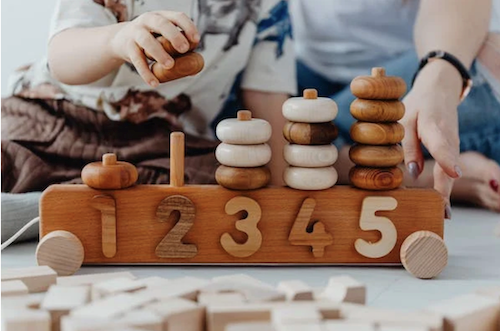Top 6 Fun and Educational Number Tracing Activities for Toddlers
Number tracing activities for toddlers are educational and fun. They foster fundamental maths skills, creativity, and imagination. Engaging in playful games and hands-on projects stimulates independent thinking, making them an ideal addition to any toddler's learning experience. Below are engaging and educational activities that'll make number tracing fun for your little ones.

Finger Painting Numbers
Finger painting numbers combine artistic expression with tracing numbers. It develops fine motor skills, enhances sensory perception, and encourages exploration of different colours and textures. It also incorporates verbal engagement to reinforce number recognition and foster a deeper understanding of numbers.
Provide a large sheet of paper for free movement and creativity, and encourage experimentation and fun. The goal is not to create a perfect masterpiece but to foster a love for numbers and learning through playful and hands-on activities.
Sandpaper Numbers
Sandpaper Numbers is a sensory-rich activity that engages toddlers' sense of touch and teaches number tracing. By cutting out numbers from sandpaper, children experience texture and resistance, enhancing fine motor skills.
Encouraging finger movements and using paper and crayons enhances the learning experience. This hands-on approach promotes fine motor skills, hand-eye coordination, concentration, and precise finger movements, building a solid foundation for future mathematical development.
Sticker Fun
Place worksheets on a flat surface and provide colourful stickers in various shapes, sizes, or themes. Encourage your toddler to trace numbers on the worksheet using the stickers, focusing on precision and control. Praise their efforts and provide positive reinforcement. Turn the activity into a game by setting goals or challenges.
Sticker Fun promotes number recognition and creativity, as children interact with numbers in a tactile manner. It can be adapted to suit different skill levels, starting with simple numbers and larger stickers and gradually progressing to more complex numbers and smaller stickers as confidence and dexterity increase.
Number Puzzles
Number tracing worksheets can be transformed into engaging puzzles that reinforce tracing skills and problem-solving abilities. These interactive activities stimulate cognitive development and encourage toddlers to practise tracing numbers.
Create number puzzles by printing large, clear numbers and cutting them into puzzle pieces. Present the puzzles to your toddler, encouraging them to solve them by tracing and fitting them correctly. Customise the puzzles to match your child's skill level, increasing complexity as they become more proficient. Additionally, number puzzles engage toddlers' sense of touch and understanding of number formation.
For slightly older children who are ready to build on their early number skills, Cazoom Maths offers excellent Year 1 number bonds up to 20 worksheets that make practising number relationships fun and engaging
Dot Marker Delight
Dot markers are a great way to engage toddlers in tracing numbers, enhancing hand-eye coordination and fine motor skills. These colourful, easy-to-use worksheets with dotted lines help develop fine motor skills and prepare them for advanced tasks like writing and drawing. To maximise their benefits, create a calm, focused environment, eliminate distractions, and provide clear instructions.
Rainbow Tracing
Rainbow Tracing is an engaging activity that uses colourful markers or crayons and number tracing worksheets to introduce toddlers to vibrant colours and develop essential skills like number sequencing and colour recognition. By tracing numbers using corresponding colours, toddlers develop fine motor skills and hand-eye coordination. This multi-sensory experience stimulates visual senses, enhances fine motor skills, and reinforces a toddler's grasp of numbers and appreciation for colour.
Endnote
Engaging toddlers in educational number tracing worksheet activities enhance their numerical skills, fine motor development, hand-eye coordination, and muscle control. These fun and exciting adventures create positive associations with numerical learning, motivating and engaging toddlers. These experiences lay the groundwork for future learning and strengthen parent-child bonds, creating meaningful memories and fostering positive relationships.